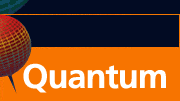CONTACTS
- Coordinator
Adolfo del Campo
-
Quantum Lunch Location:
T-Division Conference Room, TA-3,
Building 123, Room 121
 |


Quantum Institute: Visitor Schedule
The Quantum Lunch is regularly held on Thursdays in the Theoretical Division Conference Room, TA-3, Building 123, Room 121.
The organizing committee includes Ryan O. Behunin (T-4 & CNLS), Malcolm Boshier (P-21), Adolfo del Campo (T-4 & CNLS), Michael Di Rosa (C-PCS), Ivar Martin (T-4), Changhyun Ryu (P-21), Rolando D. Somma (T-4), Christopher Ticknor (T-1), and Wojciech H. Zurek (T-4).
For more information, or to nominate a speaker, contact Adolfo del Campo.
To add your name to the Quantum Lunch email list, contact Ellie Vigil.
Note special day and time
Tuesday, June 19, 2012
10:30 AM - 11:30 AM
Speaker: Alan K. Harrison (XCP-1)
Technical Host:
TOPIC: Wavefunction Collapse via a Nonlocal Relativistic Variational Principle: A New Theory of Quantum Mechanics
Abstract
Since the origin of quantum theory in the 1920's, some of its practitioners (and founders!) have been troubled by some of its features, including indeterminacy, nonlocality and entanglement. The "collapse" process described in the Copenhagen Interpretation is suspect for several reasons, and the act of "measurement," which is supposed to delimit its regime of validity, has never been unambiguously defined. In recent decades, nonlocality and entanglement have been studied energetically, both theoretically and experimentally, and the theory has been reinterpreted in imaginative ways, but many mysteries remain.
We propose that it is necessary to replace the theory by one that is explicitly nonlinear and nonlocal, and does not distinguish between measurement and non-measurement regimes. We have constructed such a theory, for which the phase of the wavefunction plays the role of a hidden variable via the process of zitterbewegung. To capture this effect, the theory must be relativistic, even when describing nonrelativistic phenomena. It is formulated as a variational principle, in which Nature attempts to minimize the sum of two spacetime integrals. The first integral tends to drive the solution toward a solution of the standard quantum mechanical wave equation, and also enforces the Born rule of outcome probabilities. The second integral drives the collapse process.
We demonstrate that the new theory correctly predicts the possible outcomes of the electron two-slit experiment, including the infamous "delayed-choice" variant. We observe that it appears to resolve some long-standing mysteries, but introduces new ones, including possible retrocausality (a cause later than its effect). It is not clear whether the new theory is deterministic.
|


